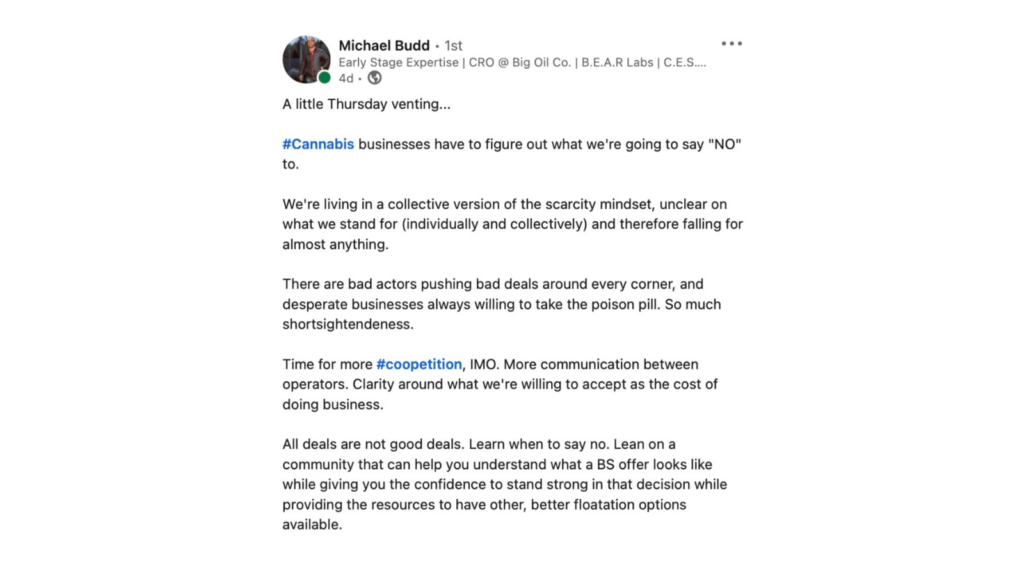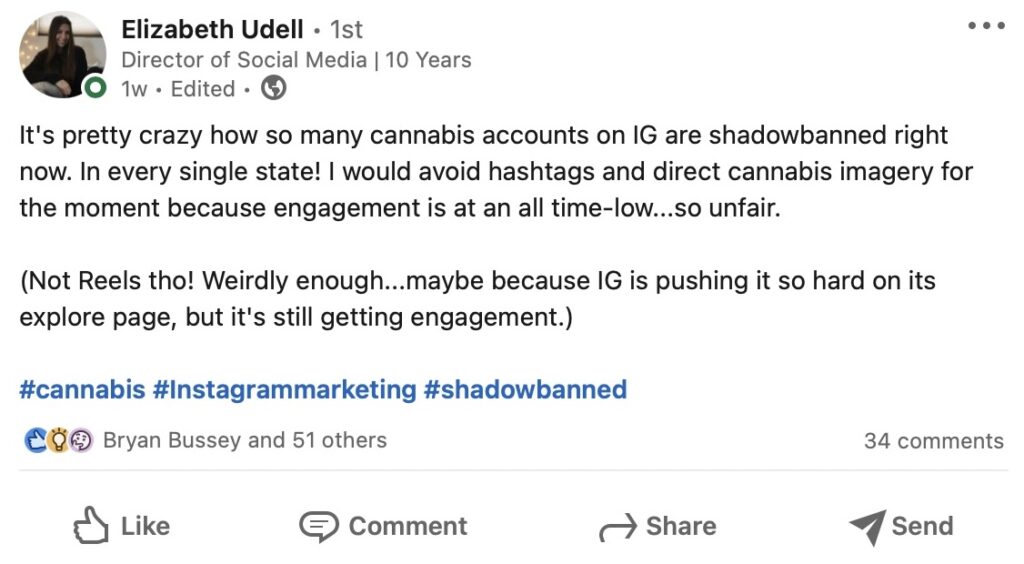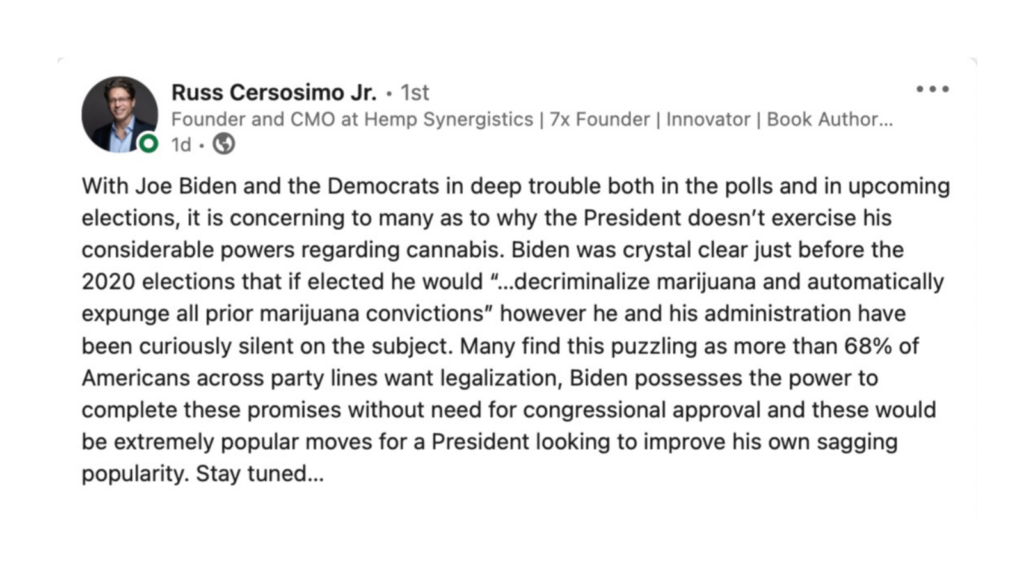19 July 2022 | Cannabis
The scarcity mindset, cannabis on Instagram, & the federal legalization question.
By Jay

The scarcity mindset is real in cannabis.
And guess what? I’ve fallen victim to it even though I’m not a plant-touching operator. It’s easy to understand why we do it (hello federal government, if you’re reading this it’s too late) because the lack of capital, federal recognition, etc. makes it next to impossible to run a cannabis business.
But operating in a lean, startup mode at all times can prevent your business from growing to the next level. It paves the way for bad actors to come in with bad deals and crush you if you’re always looking for the cheapest or fastest deal.
Especially because the fast-paced nature of cannabis oftentimes requires you to make fast decisions, which can hinder your ability to think critically.
“No matter how great a company that wants to partner with you seems, or how financially lucrative the offer is, if their company culture and the values of their C-level executives are not a perfect match, then you need to pass and find someone else. This is one of the most costly mistakes I made when launching Potters, valuing short-term financial sense over long-term goals and choosing to partner with the wrong distributors and manufacturers whose own in-house problems ended up pulling our brand down too,” wrote Casey Potter, the founder, and CEO of Potters Cannabis.
Like Michael’s post said, the scarcity mindset means we don’t know what we stand for – collectively or individually. 37% of U.S. cannabis businesses aren’t profitable. For those businesses, making rent is usually the only thing they are standing for.
What I’m Thinking 🧠
I agree with Michael’s LinkedIn post. The one snag is when he said “More communication between operators. Clarity around what we’re willing to accept at the cost of doing business.”
In an ideal world, this is the fix. Operators ban together and internally set the standards. It low-key sounds like a dream, if I’m being honest.
The problem is that the American cannabis industry is so fragmented. Even if we all decided that coming together was the best option, it’s impossible to know where to start and how to set uniform guidelines across a fragmented industry.
Additionally, nearly 40% of cannabis businesses have to make decisions solely based on their ability to open their doors tomorrow.
When push comes to shove, the collective industry’s needs aren’t a thought in their minds. They are thinking about their own children and their employees.
Pushing for standards like this isn’t wrong, and I don’t think it’s a waste of time to outline what that might look like. It just won’t be the fix we need to prevent bad business deals.
As we develop an ideal industry, pushing for federal reform is going to be the best way to see true change across the U.S.

Cannabis companies have been battling the social media giants for several years, and I imagine that’s been the case since social media entered the picture. California legalized medical cannabis in 1996 and Facebook launched in 2004.
I was a freelance content marketer for cannabis businesses before joining Workweek and I didn’t offer social media services to most clients.
It wasn’t a battle I was willing to fight when a cannabis employee’s LinkedIn profile, the website’s blog content, and company email marketing campaigns could be maintained with less effort.
“First and foremost, the promotion of sale of cannabis products is not permitted on our platform,” said Raki Wane, Instagram’s policy communications manager.
Instagram is owned by Meta, so Facebook upholds a similar policy. This doesn’t mean cannabis companies can’t use the platform, but what cannabis businesses are permitted to do on social media is unclear and often changing.
It’s easy to say “work within the bounds of the platform’s Terms of Service”, but the Terms of Service don’t give much direction beyond “don’t sell cannabis products on social media.”
That’s too ambiguous and leads to cannabis accounts being deleted almost every day.
Elizabeth’s post says “I would avoid hashtags and direct cannabis imagery for the moment because engagement is at an all-time low… so unfair.”
Research shows that Instagram posts from small accounts (less than 1,000 followers) with at least one hashtag get 29% more interactions, so workarounds like these can lead to less engagement.
What I’m Thinking 🧠
Some cannabis marketers ignore social media completely. I don’t think that’s the right approach. As a freelancer, I had that luxury, but that doesn’t mean cannabis businesses should skip out on social media.
Though I think cannabis businesses have been fighting since social media’s inception, we don’t live in 2004 anymore. The battleground has changed.
We don’t watch late-night infomercials anymore. We scroll social media at 2 AM instead and see ads there. As a result – social media influences 71% of consumer buying decisions.
Social media is how people get the news, stay up to date on current trends, and discover their favorite brands. So, telling cannabis businesses that desperately need visibility to stay off social media isn’t the answer.
Diversifying your marketing efforts and owning your audience means you can use social media and it won’t be a disaster if you’re shut down. Invest in strong email marketing campaigns and SEO.
Also, put your social media efforts in the right place. Twitter and LinkedIn are typically the most cannabis-friendly platforms.
The opportunity on social media is far too great to skip out on for cannabis businesses. But to save time, energy, and sanity – it has to be done right.
P.S. let me know if you ever want me to host a webinar or something about marketing your cannabis business & social media best practices. I’d love to dive deeper into this topic!! Shoot me a message on LinkedIn.

It’s been a year and a half since President Biden was elected President of The United States. Leaving 2020 and entering 2021, the cannabis industry was excited.
“Federal legalization is coming”, we all thought. “At the very least, meaningful federal reform.”
Cannabis stocks absolutely soared. Aurora Cannabis, one of the least-profitable companies in the industry, saw a 50% increase in stock prices after President Biden was elected.
Making it more impactful – Aurora is a Canadian company. The American cannabis industry influences so many other markets. When American cannabis wins, it’s a win for the world.
Fast forward to today.
We’re no closer to federal legalization than when the last Administration was in office.
More legislation has been deliberated, but there hasn’t been meaningful action. Democratic lawmakers have been begging President Biden for reform, to no avail.
Cannabis is a unicorn issue. More than 68% of Americans across party lines want cannabis legalization. Lawmakers aren’t acting in the will of the people by withholding it.
As Russ says, Democrats are in deep trouble both in the polls and upcoming elections. Most Democratic voters don’t even want President Biden in 2024.
We’re wondering why he hasn’t exercised federal authority regarding cannabis legalization. It would surely make him more popular.
What I’m Thinking 🧠
President Biden’s lack of action makes me think of two things:
His views haven’t changed & he disagrees with federal legalization
The federal government wants to keep this cash cow
President Biden was against cannabis and a proponent of the War on Drugs during his time in the Senate. He even authored a crime bill in 1994 that contributed to the increased incarcerations of the 1990s.
So far, President Biden himself has been silent on cannabis aside from his remark on the campaign trail in 2020 about people incarcerated for cannabis. Former Press Sec. Jen Psaki even indicated that he doesn’t support federal legalization.
Keeping cannabis illegal also means the federal government stands to see $5 billion over a 10-year period. Section 280E would be dissolved after cannabis prohibition ends, killing a billion-dollar cash cow for the feds.
That’s why I maintain the viewpoint that federal legalization is unlikely to arrive before 2026.